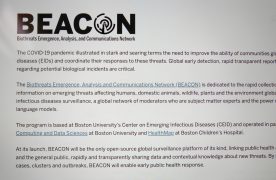We are lucky to live in an era where our friends and family are often no more distant than a FaceTime away. We can text, post or tweet for days on end if we’d like. Yet, we must be aware of our actions and our responsibility for them. The internet is not our personal domain where only you and your immediate circle of people exist. It is a vast virtual world, and people are watching.
From a security perspective, the Boston Police Department is finally capitalizing on this realm as a means of minimizing criminal activity. BPD is slated to spend $1.4 million on “social media monitoring software,” deciding on the software no later than Dec. 5. According to a Boston Globe article, “The software would be able to search blogs, websites, chat rooms, and social media platforms such as Facebook, Twitter, Instagram, and YouTube.” BPD is not focused on hacking the beloved social media outlets, but rather scanning already publicly shared information. However, the article did point out that officials would be permitted to “mask themselves by creating virtual identities.”
The inevitable debate of privacy versus security presents itself in this issue. By no means should privacy be sacrificed unreasonably in the name of security. Privacy is an inalienable right, and American citizens hold this dear. However, we must examine our relationship with privacy in today’s digital age.
Once hitting “send” or “post,” do we all really take a moment to ponder the impact it may have on the world? In many cases, the answer is most likely negative. We no longer live in a world where something we type is exclusively ours. Once that post is public, it enters a domain lacking any sort of borders. Certainly, platforms implement copyright rules, which essentially hold your personal content to specific standards, but this does not undermine the exposed status of your personal information.
At this point in time, it would be unnecessary to bemoan the state of the union. This is how it is, and this is how it has been for years. Looking forward, this will likely not change radically. The only way we can deal with “threats” to our privacy is to make ourselves as aware of the risks as possible.
BPD’s proposed software purchase would not “hack” or “spy” on your personal chats, but rather expedite a process that is already in use with enhancing software. Implementing the software eases the process of manually sifting through information, potentially stopping threats in a faster manner. It also deserves acknowledgement that this is already being done around the country, according to the Globe article.
The intent of the purchase should also be considered before jumping to conclusions. Boston Mayor Martin Walsh also stressed in the article that “the focus will be on combating terrorism in Boston and the region.” It needs to be mentioned that not long ago, many of the top officials involved in this purchase were collaborating on efforts to put the City of Boston back together after the events on April 15, 2013, the Boston Marathon Bombing. If they believe that scanning already public social media information will help prevent another horrific event, we should put a level of trust in their judgement.
The only drawback to this proposed purchase is a lack of oversight. With any level of power, there should be a system of checks and balances, and there does not seem to be one with this move. If access to a larger pool of social media is granted, who is to say when enough is enough? The hope of such a move would be to focus on high-impact information, like terrorist activity online, rather than petty crimes involving marijuana or alcohol.
In 2016, using the internet is a privilege many are granted, but one must be aware of the caveats that accompany that usage. BPD’s initiative is not a negative move that seeks to hack our privacy. In fact, it only wants to make us safer. As a city, we must be open to this idea.













